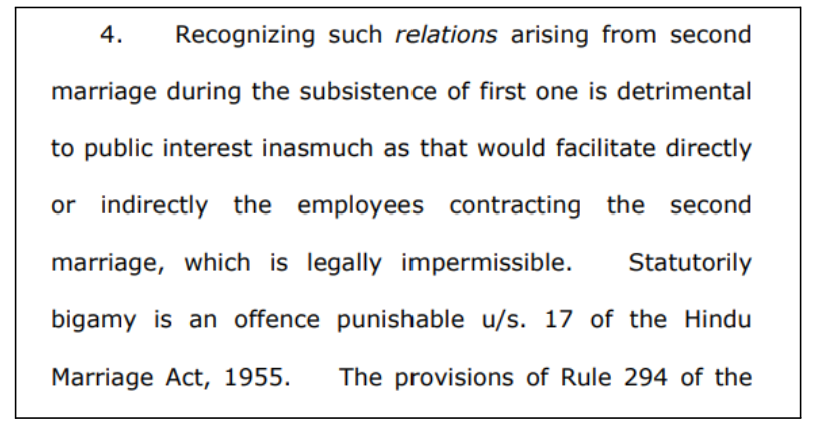In this edition of Court judgements review, we look at the Supreme Court’s judgement which observed that the role of the accused must be considered for applying principle of parity for bail application, that if a person has an intention to murder any person but kills another he never intended to, he would still be guilty of murder, Karnataka HC’s ruling that any marriage entered into when the first marriage subsists is legally invalid for Hindus, among others.
SC: The role of the accused must be considered for applying the principle of parity for bail application
In Tarun Kumar vs. Enforcement Directorate, the accused applicant was arrested in 2022 in connection with a money laundering case. He had filed a bail application which was rejected by the Delhi High Court. Aggrieved by this, the appellant approached the Supreme Court. His argument was that the other co-accused in similar circumstances was granted bail. Likewise, the appellant argued that he was also entitled to bail on grounds of parity.
The Supreme Court bench of Justices Aniruddha Bose and Bela Trivedi rejected his argument stating that parity was not the law. The Bench also added that for the application of the principle of parity, the Court would also look at the role of the accused whose application is under consideration. His co-accused who was granted bail was an internal auditor while the applicant was the Vice President, responsible for the day-to-day operations of the company.
The Court also noticed that the appellant was involved in redirecting loan funds from the company to other related businesses where the appellant had a stake as either a shareholder or director. Further, the bench also added that the principle of parity is rooted in Article 14 of the Constitution. If a court provides a benefit or advantage to someone without a legal foundation, others can’t claim the same benefit because of the wrong decision. Also highlighting the seriousness of the offence of money laundering, the Bench stated that economic offences constitute a class apart and need to be visited with a different approach in the matter of bail.
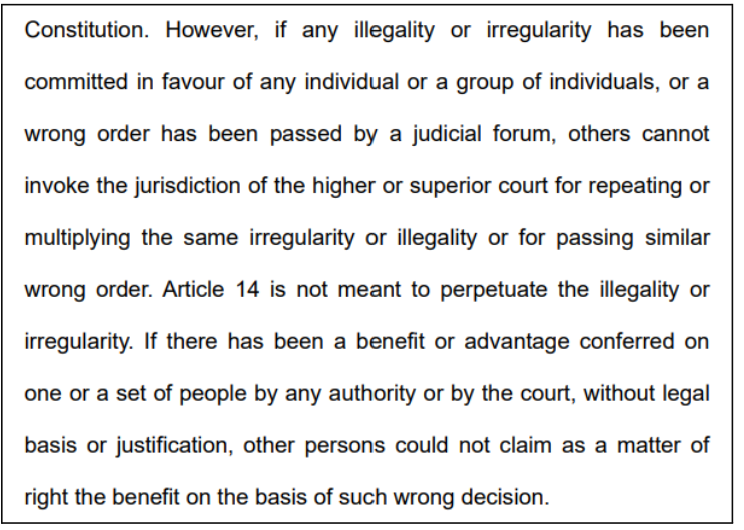
SC: If a person has an intention to murder any person but kills another he never intended to, he would still be guilty of murder
In 2007, Mahendra was injured, and Saddam Hussain was killed in an incident involving three individuals. Nanhe, the accused, was charged under Section 302 of the Indian Penal Code (IPC) for murder and under Section 25 of the Arms Act for certain offences. Mohammed Ali, the father of the deceased, witnessed Nanhe and Mahendra quarreling while present at the scene. Nanhe initially left but then turned back and fired a shot with a country-made pistol. The bullet struck Saddam’s neck and hit Mahendra’s head. Nanhe was apprehended at the scene, and Saddam was taken to the district hospital where he succumbed to his injuries. The weapon and cartridges were recovered from Nanhe. Both the Trial Court and the High Court determined Nanhe’s guilt under Section 302 IPC for the offense.
In Nanhe vs. State of Uttar Pradesh, the appellant challenged the judgements of the courts stating that he had no intention to kill Saddam and that his death was accidental. But he had intended to kill Mahendra. The Supreme Court bench of Justices Abhay S. Oka and Justice Pankaj Mithal invoked Section 301 IPC, which deals with the ‘Doctrine of Transfer of Malice or Transmigration of Motive’. It is a legal principle that holds a person responsible for their intent to commit harm or unlawful acts, even if the consequences affect someone other than the intended target.
In this case, the Supreme Court also referred to past cases and held that the appellant was culpable for committing an offense of culpable homicide amounting to murder under Section 302 IPC. According to the principle, the specific intention to kill a different person is not crucial. What matters is that the appellant had the intention to commit the offense, and even if accidentally, they ended up killing someone else. Considering the above, the Supreme Court upheld the High Court’s decision to convict him under section 302 IPC for murder.
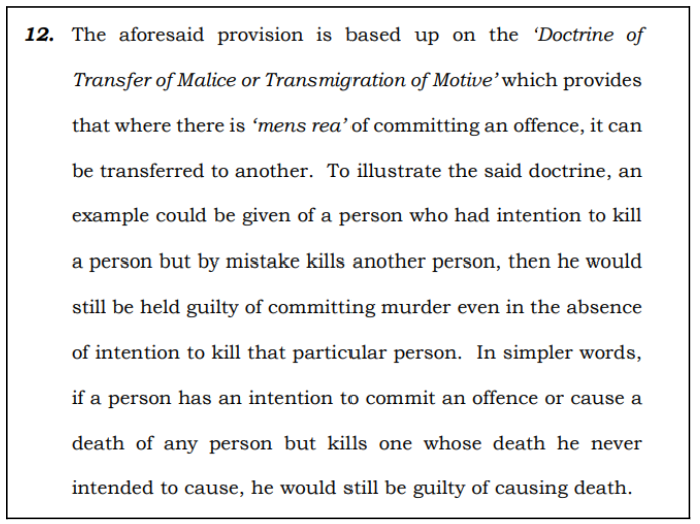
SC: Any witness claiming they saw the attesting witness sign the Will is not adequate to prove the Will as per Section 69
In Moturu Nalini Kanth vs. Gainedi Kaliprasad, the Supreme Court was hearing a property dispute in a civil appeal challenging the judgment passed by the Andhra Pradesh High Court. A woman estimated to be in her 70s had adopted a child under one year and passed away two months later in 1985. The adopted child, who was then a minor, claimed that the woman had left all her assets to him through a registered ‘Will’ from 1982. He also added that she had revoked her prior ‘Will’ from 1981, which had favoured Kaliprasad, her grandson. Kaliprasad challenged Nalini Kanth’s claim to the property questioning the genuineness of the adoption and the legal validity of the ‘Will’.
At first, the trial court favoured Kanth. But upon appeal, the High Court overturned this decision, raising concerns about the validity of the adoption papers and contradicting the trial court’s initial ruling in Kanth’s favour. Kanth then sought a reversal of the High Court’s decision by appealing to the Supreme Court.
The Supreme Court bench of Justice CT Ravikumar and Justice Sanjay Kumar scrutinized the evidence and identified certain inconsistencies in the adoption deed and ceremony. The contents of the adoption deed appeared to be influenced by someone and unconvincing. Section 69 of the Evidence Act was utilized to verify the authenticity of the ‘Will’. Section 69 is executed in cases when no attesting witnesses are found. However, the evidence provided by the Sub-Registrar under Section 69 was deemed unconvincing by the Court. Further, the Bench observed that it is not enough to have just any witness claim they saw the attesting witness sign the ‘Will’. The law requires the testimony of at least one attesting witness directly involved in signing the ‘Will’.
The court also found gaps in the adoption process as required by the Hindu Adoption and Maintenance Act, 1956, especially the absence of mandatory giving and taking rituals. Expressing doubts about the credibility of the adoption, the court highlighted impracticalities in the situation, such as the likelihood of an elderly woman willingly taking on the responsibility of caring for an infant at such an advanced age. Ultimately, the Supreme Court rejected Kanth’s claim, emphasizing the necessity of strictly following legal provisions, stating that ‘Will’ registration alone doesn’t guarantee validity.
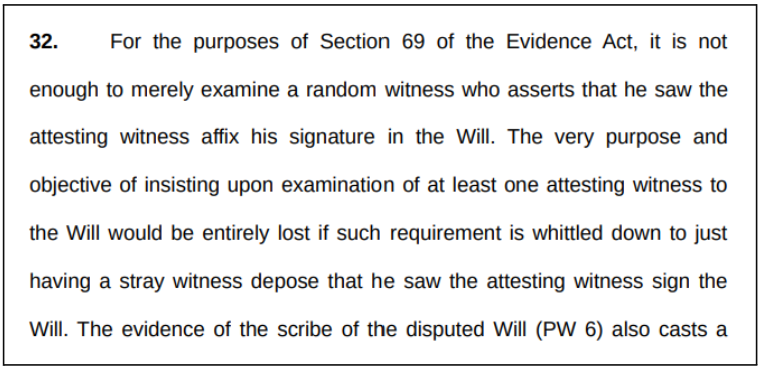
Karnataka HC: Temples are inclusive places of worship, and any form of discrimination is unacceptable
The case, Panduranga Bhat vs. the State By Malebennur Police & Another involves a petition filed to quash criminal proceedings against eight persons charged under provisions of Sections 3(1)(10) and (11) of the Scheduled Castes and Scheduled Tribes (Prevention of Atrocities) Act, 1989, and Sections 506, 341, 504, 143, 147, 148, 149, 323, 324 and 354(B) of the IPC.
In 2016, the complainant had been to the Gadi Chowdeshwari temple along with her family members. The complainant, her husband, and their child along with other villagers were stopped at the stairs and not let enter the temple by the petitioner as the complainant and others in the group belonged to Scheduled Caste. The petitioners had even assaulted the complainant and others in the group and verbally abused the complainant’s family and their caste, describing how their visit to the temple would make the temple “unholy.”
The petitioners had approached the High Court following the dismissal of their petition by the Trial Court. Justice M Nagaprasanna of the Karnataka High Court rejected the petition stating that the fact that such discrimination is still prevailing shocked the conscience of the Court. It was clearly established that they had committed the said offences. Adding that the attitude of the petitioners was regressive, the Bench stated that worshipping of the deity, by entering into the temple, is to be given to one and all and any kind of bigotry or discrimination is unacceptable. Observing that the complaint dates to 2016, the Court instructed the concerned court to conclude the proceedings within six months.
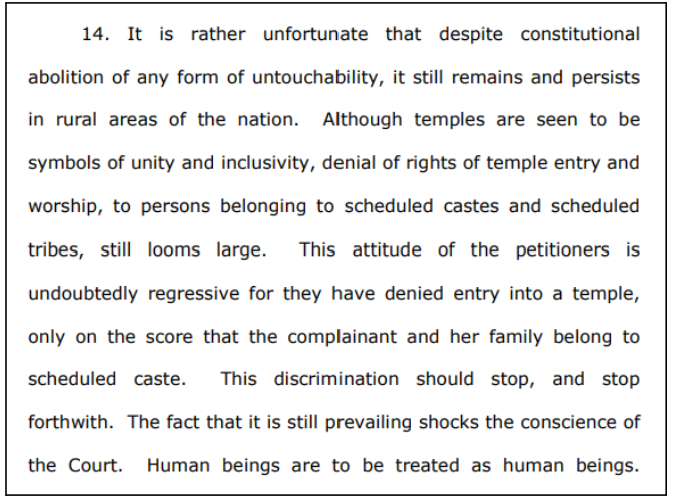
Karnataka HC: Any marriage entered into when the first marriage subsists is legally invalid for Hindus
The case, Mahalakshmamma vs. The Secretary, Department of Rural Development and Panchayatraj, was an appeal filed by a woman who sought the family pension of a deceased government employee. She claimed to be the second wife of the deceased when his first marriage was subsisting. The Karnataka High Court’s division bench of Chief Justice Prasanna B Varale and Justice Krishna S Dixit dismissed the appeal stating that monogamy was a legal mandate for Hindus and any marriage entered into while the first wife remains alive, and the marriage is not dissolved is deemed legally invalid.
Legally, the family pension will be sanctioned only to the ‘wife’ as per Rule 294 of the Karnataka Civil Services Rules and not to someone whose marriage is not legally valid. There is also a restricted recognition of the legitimacy of children born from these marriages, as per Section 16 of the Hindu Marriages Act, 1955. The Bench also added that recognizing such second marriages while the first marriage still exists was against the public interest as it could encourage employees to engage in second marriages, which is not allowed by law. Moreover, Bigamy is a punishable offense under Section 17 of the Hindu Marriage Act, of 1955.
